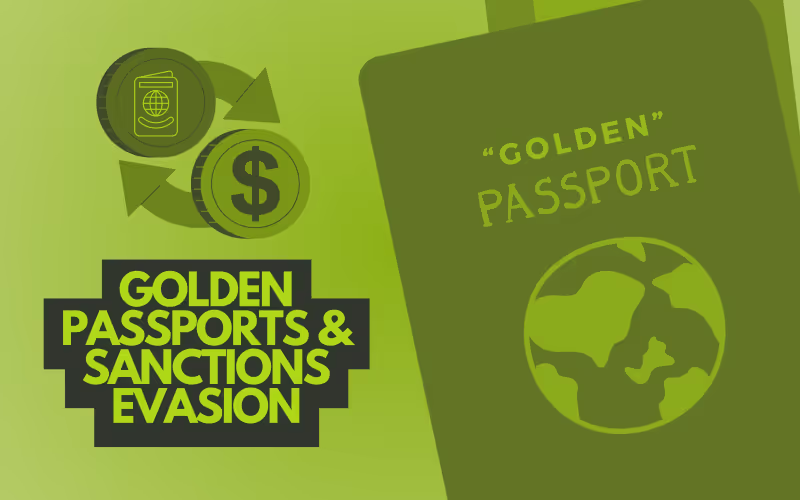
Golden Passports and Sanctions Evasion Explained
Sanctions evasion has always been a hot topic that makes international news. And since Russia's 2022 invasion of Ukraine - and the subsequent growth of sanctions imposed on Russia - golden passports and visas have come under increased scrutiny. Why? Because individuals and organized criminal groups are using them to circumvent sanctions. In this article, we explore the connection and provide some examples.
Golden Passports? Golden Visas? What Are They?
Before diving into the matter at hand - sanctions evasion - let's quickly refresh ourselves about golden passports and visas.
And it's necessary to get our terminology correct. A golden passport and a golden visa are terms used interchangeably. This is because they are both types of immigrant investor programs. If it's a passport, the investment directly leads to fast citizenship of the county offering the program. If it's a visa, the investment leads to rapid residency (which may also lead to accelerated citizenship).
These programs all cost, on average, in the hundreds of thousands of dollars range, with the most popular type of investment being in real estate.
The Supply Side: Why Countries Offer These Programs
Countries offer immigrant investment programs, colloquized as cash-for-passports, to attract foreign capital, stimulate economic growth, and increase foreign direct investment.
More often than not, smaller countries (with something to offer, like visa-free travel across Europe) are the principal providers. Why? Because they are more likely to need the programs to boost economic diversification and generate revenue.
However, that's not to say larger economies haven't jumped on the bandwagon, too. Programs (that have both since closed) include the UK's Investor Visa Tier 1 and Ireland's Immigrant Investor Programme (IIP).
The fact that most immigrant investment programs fall within similar price ranges is not a coincidence. After all, it's an open market with countries competing for business.
The Demand Side: Why People Want These Programs
Knowing the legal reasons why individuals sign up for golden passports and visas is important.
For example:
- To enjoy visa-free travel (if their current passport is more limited)
- Entrepreneurs can access global business opportunities
- Security and stability (if they come from a country with unrest)
- Higher quality of life (for example, better education for their children)
European countries like Cyprus, Malta, Greece, Portugal, Spain, and Ireland have traditionally been popular destinations. Why? Because of the lure of visa-free travel across Europe, the higher quality of life, and education.
It's crucial to emphasize that there are numerous legitimate reasons why individuals participate in these programs. And they should not face stigmatization due to the negative connotations - remember, there are multiple success stories of golden passport and visa programs leading to positive effects such as job creation and economic growth.
But now for the elephant in the room. Because the reality is this: Golden passport and visa programs have a dark side.
And what's become apparent in the last few years is that these golden programs are being used to evade sanctions. In 2022, following the Russian invasion of Ukraine, a Biden Administration official described golden passport programs as a way for wealthy Russians to become citizens in other countries and access certain financial systems.
In this article, we are solely looking at sanctions evasion, but here are some more illegal reasons why individuals may seek a golden passport or golden residency visa:
- Money laundering
- Tax evasion
Golden Passports and Visas to Evade Sanctions: How Does It Work?
Now let's get to the meat on the bone for this article. Over the last two years, it's become more well-known that individuals seeking to evade sanctions are utilizing golden passports and visa programs.
But it's important to understand something first:
For an individual on a sanctions list, obtaining an EU passport (or another passport) isn't the holy grail in evading sanctions against them. EU officials over the years have publicly stressed this point. Actions like asset freezing and travel bans will still follow their trail.
The most common scenario for immigrant investor programs used to evade sanctions is by individuals not personally appearing on sanctions lists.
However, they do come from heavily sanctioned countries - such as Russia. For an individual (including those part of criminal groups) from a sanctioned country seeking to continue their legal or illegal economic activities via a golden passport or golden residency visa, the benefits are clear:
- Financial asset mobility (access to non-sanctioned financial products)
- Freedom of movement to conduct business
- Access to far more markets and economic opportunities
- Reduced dependence on a sanctioned home country
- Reduced scrutiny of financial activities
The above reasons assist individuals in getting around sanctions. And it means this: Golden passports and visa programs weaken the effectiveness of sanctions imposed against countries.
Golden Passports and Visa Programs Used for Sanctions Evasion: 3 Examples
We've looked at the theory. So now, let's look at how the problem has manifested in real life. Here are some well-publicized examples that have recently come to light:
Cyprus Golden Passport Program
On February 7, 2023, the Organized Crime and Corruption Reporting Project (OCCRP) reported that Russian individuals part of a Russian arms sanctions evasion network acquired EU citizenship in 2016 through Cyprus' golden passport program (this program has since terminated).
Even after Russia invaded Ukraine in February 2022, they continued supplying hi-tech gadgets to Russia. Note: In February 2023, OFAC sanctioned 22 individuals associated with the group.
You can learn more here.
UK Tier 1 Investment Scheme
In April 2022, the UK government admitted giving seven Russians (now under sanctions) golden visas after Russia first invaded Ukraine in 2014. This meant they had unrestricted UK bank accounts and UK residency. Note: The British government closed the scheme in February 2022 amid the build-up of Russian forces on Ukraine’s border.
Read the full story here.
The UAE Golden Visa
In 2023, it's been widely reported that wealthy Russians are using the United Arab Emirates (UAE) as a safe haven for evading sanctions. The UAE golden visa scheme enables applicants to gain long-term residency by investing 10 million dirhams ($290,000) in a local company or an investment fund.
According to reports, "The flocking of Russians to Dubai has meant that billions of potentially sanctionable dollars and euros have been transferred to the emirate."
Governments Are Phasing Out Golden Programs
Here is something to take on board: Golden passports and visas to evade sanctions have been a problem for many years.
So what changed?
As many of you reading already know, the 2022 Russian invasion of Ukraine meant that political will developed strong enough to attack the problem like never before.
Only days after Russia began its invasion of Ukraine on February 23, 2022, leaders of the European Commission, France, Germany, Italy, the UK, Canada, and the US began planning to limit golden passports and visas.
We can't go into all the vast and fast-moving developments, but here are a few of them:
- On March 8, 2022, EU lawmakers voted in favor of banning programs that exchange residency and citizenship for cash by 2025
- Countries such as Italy, Spain, Greece, Cyprus, Portugal, and more have either scrapped, are likely to scrap, or will restructure their programs
- Malta suspended its program (only for Russian and Belarusian nationals)
- The UK and Ireland have scrapped their programs
The key takeaway is this: Although there is a global trend to tackle the golden passports and visa problem in light of the 2022 Russian invasion of Ukraine, progress will be sluggish in a highly fragmented landscape.
Closing Thoughts
This article examined how golden passports and visas are connected to sanctions evasion.
And the link is as clear as night and day. That's why, especially now that we live in an era of increased sanctions evasion scrutiny, governments (especially in Europe and North America) are phasing them out.
We still aren't sure how everything will play out. How long will the momentum last? Will governments backtrack or water down their commitments? What countries will replace the void and become the new hotspots for evading sanctions?
Only time will tell.
But you can be sure sanctions.io will follow developments - follow us on LinkedIn for the latest updates.
How sanctions.io Helps With Sanctions Compliance
sanctions.io is a highly reliable and cost-effective solution for sanction checking. AI-powered and with an enterprise-grade API with 99.99% uptime are reasons why customers globally trust us with their sanctions screening needs.
To learn more about how our sanctions, PEP, and criminal watchlist screening service can support your organization's compliance program:
7-Day Free Trial (No Credit Card Required)
We offer a free 7-day trial (no credit card is required) and will be delighted to walk you through our service.



